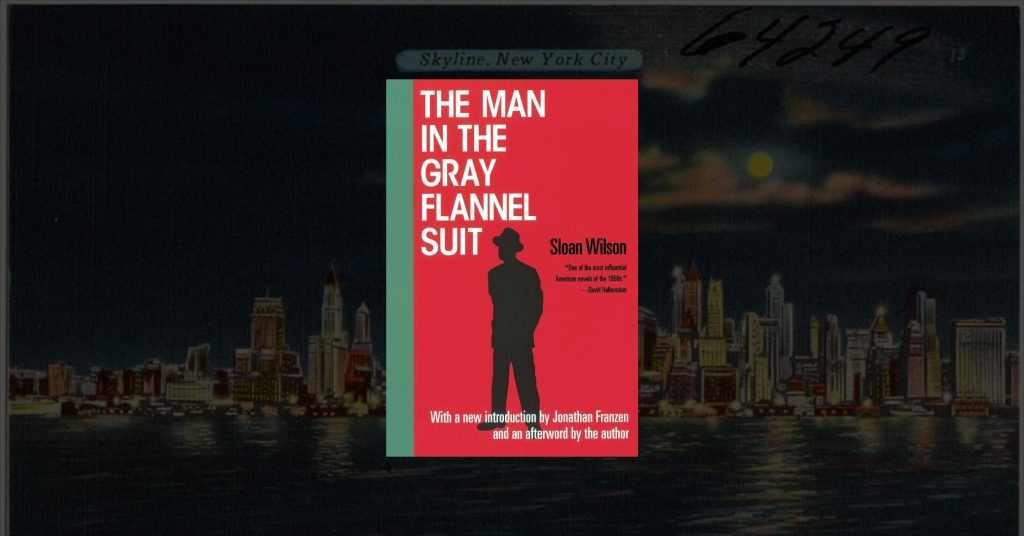
Welcome to my monthly book recommendation for September! Every month, I recommend a book that I’ve personally read and find worthwhile enough to recommend to my own readers. In each post, I’ll introduce the book, discuss why I found reading it worthwhile, and the major themes the book touches upon. I won’t include any major spoilers, but I may discuss some of the characters and specific details or locations from within the book.
My recommendation for September, 2025 is Sloan Wilson’s The Man in the Gray Flannel Suit.
The Man in the Gray Flannel Suit
Available on Amazon
Author: Sloan Wilson
Genre: Fiction
Description: Universally acclaimed when first published in 1955, The Man in the Gray Flannel Suit captured the mood of a generation. Its title — like Catch-22 and Fahrenheit 451 — has become a part of America’s cultural vocabulary. Tom Rath doesn’t want anything extraordinary out of life: just a decent home, enough money to support his family, and a career that won’t crush his spirit. After returning from World War II, he takes a PR job at a television network. It is inane, dehumanizing work. But when a series of personal crises force him to reexamine his priorities — and take responsibility for his past — he is finally moved to carve out an identity for himself. This is Sloan Wilson’s searing indictment of a society that had just begun to lose touch with its citizens. The Man in the Gray Flannel Suit is a classic of American literature and the basis of the award-winning film starring Gregory Peck. “A consequential novel.” — Saturday Review
My Thoughts
Sloan Wilson’s “The Man in the Gray Flannel Suit” explores the unhappy life of Tom, a corporate employee who’s found himself lost in the corporate rat race for nearly a decade, ever since returning home from WWII. With financial burdens, war-time secrets and burdens, and little hope for a brighter future, he begrudgingly clocks in and out every day, going through the motions without any sense of real purpose, until a new business opportunity, shortly followed by a tragic event, spur him and his wife to make real change in their lives, and more importantly, to try and find happiness.
As Tom, and his wife Betsy, try to navigate the complexities of their circumstances, new and old, they are confronted with numerous personal and societal challenges to their future happiness and prosperity which force them, and the reader, to contemplate “life’s big problems” on a deeper, more philosophical level. Wilson explores themes of corporate soullessness, the difficulties of determining authenticity from appearance, and the struggles of modern life that drive people to unhappiness, and sometimes, their families to separation. Those these problems, and Tom’s attempts to move beyond them, are framed within the portrait of a corporate man in the 1950s, their impact on the reader remains timeless.
On a personal level, I appreciated this unique view into the 1950s. Some may even find it nostalgic, including those who were not alive during that time period. On a reader-accessibility level, the lifestyles, problems, and ethical quandaries portrayed are similar enough to those of the modern day that most people will be able to open the book with a strong frame of reference, especially those who’ve adopted a corporate lifestyle.
Wilson’s writing in this book is accessible to a wide range of audiences. Most readers will find the pages of this book flipping at a fast rate, something which cannot be said for many of the monthly book recommendations I’ve offered in the past. I don’t consider this to be positive or negative necessarily, but I do recognize that effectively writing in this style is difficult. When it’s done properly, it makes the reading experience feel effortless, save the considerations the reader may have of the book’s subtextual contents.
In my opinion, one of the most important pieces of wisdom the book offers is the lesson that we cannot and must not judge an individual’s actions based on our own preconceptions and idle considerations. This stood out most strongly to me during Tom’s reflections on his actions during the war, but appeared also in the character’s thoughts of themselves and others, as well as indirectly, in passages where Wilson invites the reader to speculate on the actions that took place during the war, and years later, in the workforce Tom has found himself in. This lesson is highly relevant for today’s readers, as it’s all too easy for individuals to post ill-considered ethical opinions online in their own echo chambers, occasionally causing real, unfair problems for those under scrutiny. This is far from the only piece of wisdom the book imparts, but it stood out to me personally enough to give it special recognition.
Overall, I would recommend this book to a general audience, but especially to those who are corporate employees, those who find themselves discontented and unhappy with their lives, and those who feel there’s “something more” but don’t know what that something more is or how to achieve it.
